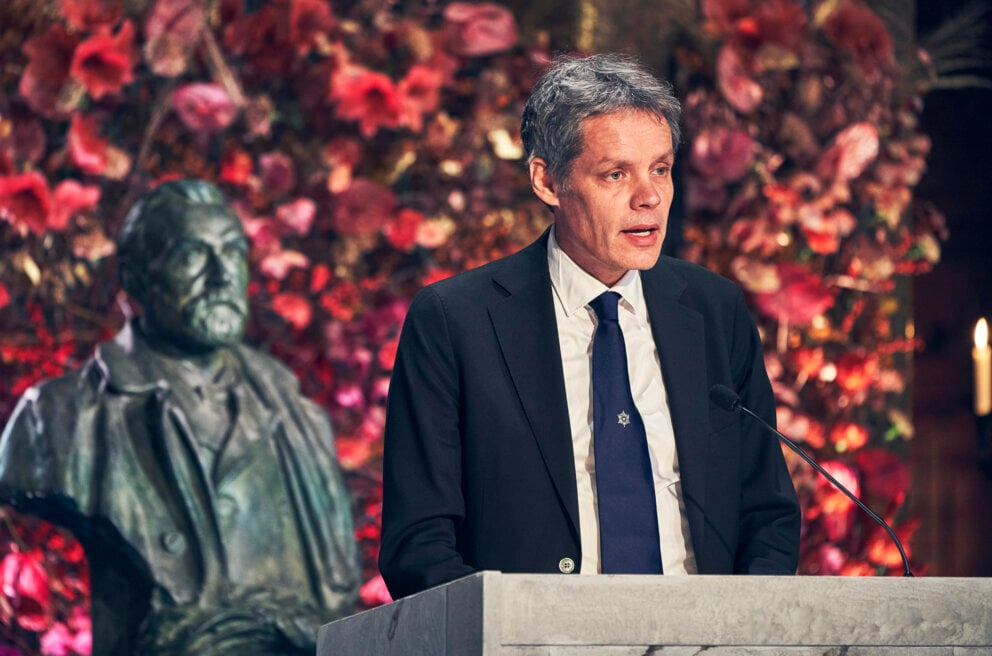Award ceremony speech

Professor Ulf Danielsson delivering the presentation speech for the 2020 Nobel Prize in Physics.
© Nobel Prize Outreach. Photo: Dan Lepp
English
Swedish
Presentation Speech by Professor Ulf Danielsson, Member of the Royal Swedish Academy of Sciences; Member of the Nobel Committee for Physics, 10 December 2020
Your Majesties, Your Royal Highnesses, Esteemed Nobel Laureates, Ladies and Gentlemen,
This year’s Laureates have made groundbreaking discoveries concerning the most mythical and strange objects in physics: black holes.
Black holes are bodies with gravity so strong that not even light can escape. To create a black hole, the earth would have to be squeezed down to the size of a pea and the sun compressed into a sphere comparable in size to the central parts of Stockholm.
The first speculation that such a thing could exist in our universe dates back to the end of the 18th century. But it was not until Einstein presented his general theory of relativity in 1915 that one had a theory powerful enough to describe them.
According to Einstein’s theory of gravity, time and gravity are intimately connected. Time goes by a trillionth of a second per hour slower at my feet than at my head. Although the difference is small, it gives rise to what we call gravity. It is strange that only by lifting a glass of water with my own hand can I feel this small difference in the passage of time.
At the horizon of a black hole, on the other hand, gravity is so strong that time seems to stand still. And within the horizon, time curves so that it points inward toward the center of the black hole. Anyone who is unlucky enough to fall into a black hole therefore has as much difficulty getting out again as traveling back in time. And in the middle of the black hole, in the unfortunate traveler’s near future, lurks the singularity where the known laws of nature cease to apply. Black holes are truly the most extreme objects in physics.
But the mathematics of the general theory of relativity is difficult, and for a long time black holes were mere speculation. And many physicists, for good reasons, doubted their existence. Not even Einstein thought they could exist. It was only in 1965, half a century after Einstein formulated his theory, that Roger Penrose was able to master the mathematics and show that black holes are an inevitable consequence of general relativity. If matter accumulates densely enough, nothing can prevent a collapse into a black hole.
But, where are they? For a long time, it was suspected that black holes could hide in the center of many galaxies, where they could explain eruptions of extreme energy. Could there perhaps also be a black hole in the center of our own galaxy, the Milky Way?
Reinhard Genzel and Andrea Ghez used powerful telescopes to study the mysterious interior of the Milky Way. The heart of our galaxy is hidden inside a cloud of dust and it is only by using infrared light that one can discern what is going on.
With the help of the instruments they developed, they were able to follow the motion of individual stars and discover how these stars revolved around something they could not see. Calculations showed that the invisible object must have a mass about four million times that of the sun. Within the framework of current theories, there is no other explanation than a black hole. A more than two hundred year old riddle has been solved. But black holes also mark the limit of our knowledge of the physical world. As we look into the dark abysses of black holes, there may be new secrets to reveal.
Professors Penrose, Genzel and Ghez, you have been awarded the 2020 Nobel Prize in Physics for your outstanding contributions to our understanding of black holes. It is an honor and a privilege to convey to you, on behalf of the Royal Swedish Academy of Sciences, our warmest congratulations.
Copyright © The Nobel Foundation 2020
Nobel Prizes and laureates
See them all presented here.
